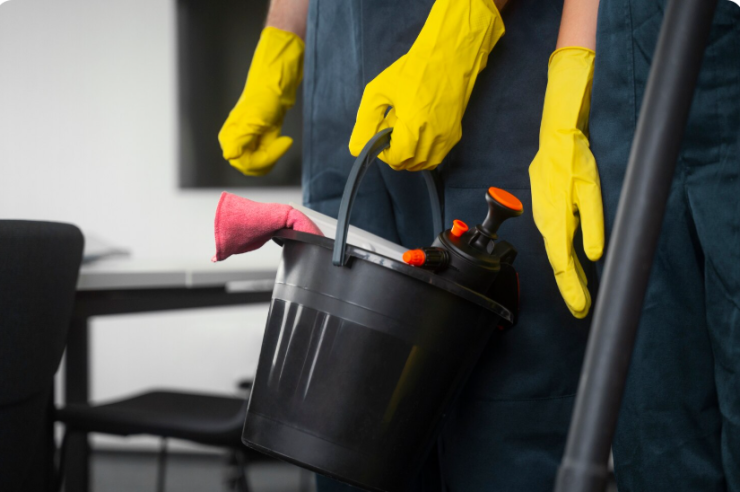How to Finish an Attic: Turn Unused Space Into Livable Square Footage
Home Office in a Finished White Attic Table of Contents • Attic Remodel Cost Overview • Key Questions Before You...

Construction projects create extensive dust, debris, and residue that standard cleaning methods cannot address adequately. Post construction cleaning services specialize in removing construction-related contaminants to prepare spaces for occupancy. Professional cleaning ensures properties are safe, sanitary, and ready for immediate use.
Construction dust penetrates every surface and crevice during building projects, requiring specialized equipment and techniques for complete removal. Fine particles settle on walls, floors, fixtures, and inside cabinets and closets. Standard cleaning methods cannot reach all contaminated areas or remove stubborn construction residues effectively.
Safety hazards from construction debris include sharp objects, chemical residues, and respiratory irritants that pose risks to occupants. Professional cleaning services identify and eliminate these hazards while protecting workers with appropriate safety equipment. Proper cleanup prevents injuries and health problems for future occupants.
Code compliance requirements may mandate specific cleaning procedures before occupancy permits are issued. Local authorities often require professional cleaning certification for commercial properties and some residential projects. Meeting these requirements ensures properties can be occupied legally and safely.
Initial cleanup removes large debris, excess materials, and obvious construction waste from work areas. This phase focuses on making spaces accessible for detailed cleaning while protecting surfaces from damage during debris removal. Initial cleanup creates a foundation for thorough cleaning procedures.
Detail cleaning addresses dust accumulation, residue removal, and surface preparation throughout all areas of construction projects. This phase requires specialized equipment and cleaning products designed for construction contaminants. Detail cleaning prepares surfaces for final finishing and occupancy.
Final cleaning ensures all areas meet occupancy standards and pass required inspections. This phase includes touch-up work, final surface protection, and verification that all construction cleaning requirements have been met. Final cleaning delivers spaces ready for immediate use.
Dust removal requires industrial equipment capable of capturing fine particles that standard vacuum cleaners cannot handle. HEPA filtration systems prevent redistribution of contaminants during cleaning operations. Professional dust removal eliminates respiratory irritants and prepares surfaces for finishing work.
Window and glass cleaning removes construction residues that standard glass cleaners cannot dissolve. Professional cleaning services use specialized products and techniques to restore clarity without scratching or damaging glass surfaces. Clean windows improve natural lighting and overall appearance.
Floor cleaning procedures vary by surface type and contamination level from construction activities. Hardwood floors may require specialized restoration techniques, while tile and stone surfaces need deep cleaning to remove grout residue and sealer compounds. Professional floor cleaning restores original appearance and prepares surfaces for use.
Industrial vacuum systems with HEPA filtration capture construction dust without releasing particles back into air. These systems provide more suction power and filtration capability than standard cleaning equipment. Professional vacuum systems ensure complete dust removal from all surfaces.
Pressure washing equipment removes stubborn residues from exterior surfaces and some interior applications. High-pressure water systems can remove paint overspray, concrete dust, and adhesive residues that other cleaning methods cannot address. Pressure washing restores original surface appearance efficiently.
Air scrubbing systems improve indoor air quality during cleaning operations by continuously filtering airborne particles. These systems prevent dust redistribution while protecting workers and preparing spaces for occupancy. Air scrubbing technology ensures cleaner final results.
Respiratory protection prevents workers from inhaling construction dust and chemical residues during cleaning operations. Professional cleaning services provide appropriate personal protective equipment and follow safety protocols. Proper protection ensures worker health and prevents contamination spread.
Chemical handling procedures ensure cleaning products are used safely and effectively without creating additional hazards. Professional cleaning services understand product compatibility and ventilation requirements for safe application. Proper chemical handling protects both workers and future occupants.
Waste disposal follows environmental regulations for construction debris and contaminated cleaning materials. Professional services arrange proper disposal of hazardous materials while recycling appropriate components. Responsible waste disposal protects the environment and ensures regulatory compliance.
Inspection procedures verify cleaning work meets industry standards and customer expectations before project completion. Professional cleaning services conduct systematic inspections and address any deficiencies immediately. Quality control ensures properties are truly ready for occupancy.
Documentation provides records of cleaning procedures and results for property owners and regulatory authorities. Professional services maintain detailed records of work performed and materials used during cleaning operations. Proper documentation supports warranty claims and regulatory compliance.
Customer walkthrough procedures allow property owners to verify cleaning results and identify any areas needing additional attention. Professional services encourage customer participation in final inspections to ensure complete satisfaction. Customer involvement prevents disputes and ensures expectations are met.
Project size affects cleaning costs based on square footage and complexity of spaces requiring cleaning. Larger projects benefit from economies of scale, while smaller projects may have higher per-square-foot costs. Knowing size factors helps budget cleaning services accurately.
Contamination level determines cleaning requirements and time needed to achieve acceptable results. Heavy construction projects create more debris and require more intensive cleaning than light renovation work. Contamination assessment helps establish appropriate cleaning scope and pricing.
Timeline requirements affect costs when accelerated cleaning schedules are needed to meet occupancy deadlines. Rush cleaning projects may require additional crews or extended work hours at premium rates. Planning adequate cleaning time helps control costs.
Experience with construction projects ensures cleaning services understand the specific requirements and challenges of post construction cleaning services. Construction cleaning differs significantly from standard janitorial services and requires specialized knowledge. Experienced services deliver better results more efficiently.
Insurance coverage protects property owners from liability during cleaning operations while ensuring workers are protected adequately. Professional cleaning services carry insurance that covers both general liability and workers compensation. Proper coverage provides peace of mind during cleaning projects.